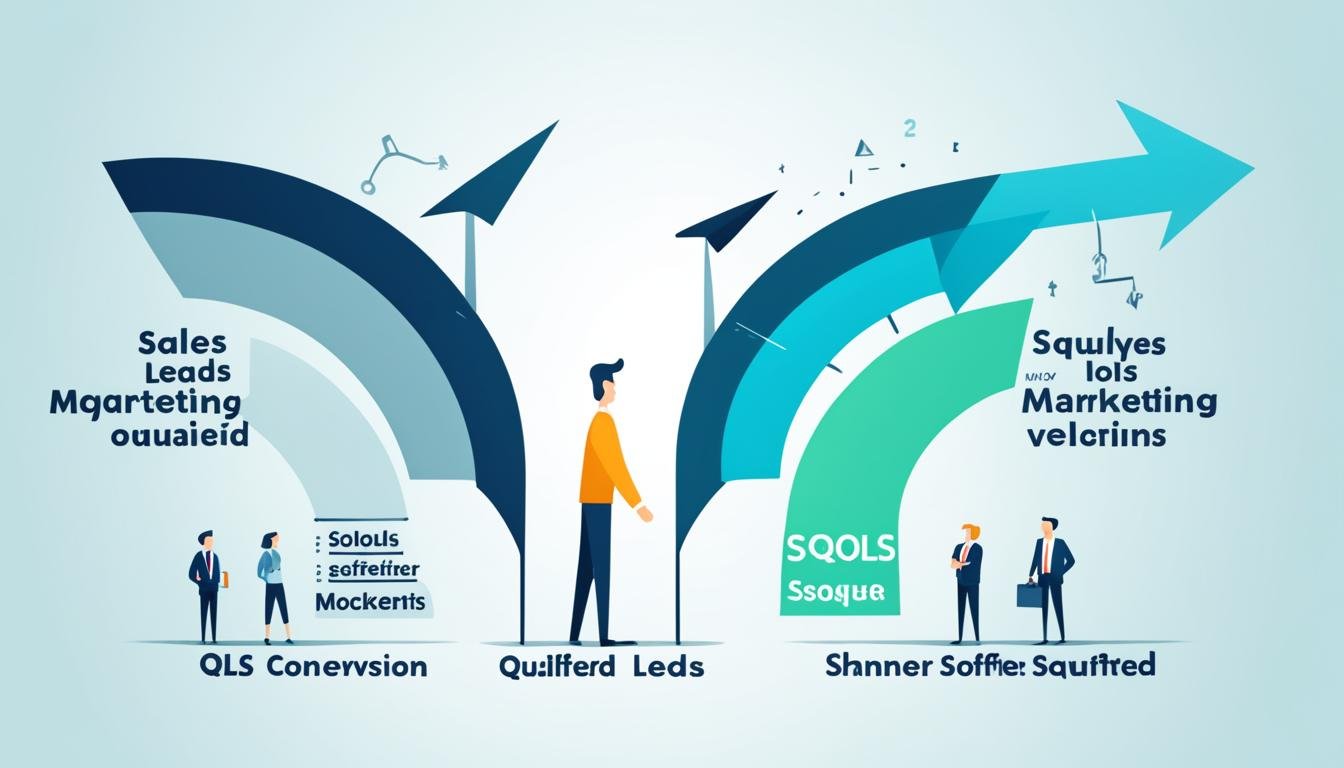Sales and Marketing Qualified Leads (SQLs): Generating Opportunities
In today’s fast-paced sales and marketing world, knowing the difference between Sales Qualified Leads (SQLs) and Marketing Qualified Leads (MQLs) is key. But what makes them different, and how can you use this knowledge to get more qualified leads? Let’s explore how to make the most of your sales and marketing efforts.
Key Takeaways
- Understanding the difference between SQLs and MQLs is essential for optimizing your sales and marketing strategies.
- Lead scoring and lead nurturing are crucial for identifying and converting SQLs from MQLs.
- Collaboration between sales and marketing teams is key to ensuring a smooth transition from MQL to SQL.
- Utilizing data analytics and marketing automation can help refine your sales funnel and drive more SQLs.
- Aligning your CRM, marketing platforms, and lead scoring processes is vital for generating high-quality SQLs.
Understanding Sales Qualified Leads (SQLs) and Marketing Qualified Leads (MQLs)
In the world of sales and marketing, knowing the difference between Sales Qualified Leads (SQLs) and Marketing Qualified Leads (MQLs) is key. They both are potential customers but vary in how ready they are for your business.
What is a Sales Qualified Lead (SQL)?
A Sales Qualified Lead (SQL) is a lead that’s ready for sales talks. They’ve passed certain checks by the sales team. This means they have the money, the power, and the plan to buy soon. SQLs are likely to move into the sales process.
What is a Marketing Qualified Lead (MQL)?
A Marketing Qualified Lead (MQL) shows interest in your product or service. They might have downloaded papers, gone to webinars, or signed up for emails. MQLs have potential but aren’t yet ready for sales talks. They need more marketing attention to get ready.
SQL vs. MQL: The Difference
SQLs and MQLs differ in sales readiness. SQLs are ready to buy and can talk to sales right away. MQLs need more work to become customers. They need content, personal messages, and campaigns to help them decide.
Knowing the difference between SQLs and MQLs helps your sales and marketing work together better. It makes sure leads turn into customers smoothly. And it helps you get the most from your marketing efforts.
The Importance of Differentiating Between MQLs and SQLs
It’s key to know the difference between Marketing Qualified Leads (MQLs) and Sales Qualified Leads (SQLs) for better sales and marketing teamwork. MQLs are people who show interest in your products by downloading content, going to webinars, or interacting with emails. SQLs are leads that are ready to buy, like when they ask for a demo or talk to a sales person.
Knowing the difference saves your sales team time. They can focus on the best leads. By watching how leads act, you can spot those ready for a sales talk (SQLs). This makes conversations more meaningful and boosts your sales funnel’s efficiency.
Also, seeing how MQLs turn into SQLs helps you understand your marketing and sales well. By looking at how leads move through the funnel, you can find problems, make marketing better, and tweak your lead scoring and nurturing. This leads to more SQLs and higher conversion rates.
“Effective lead management is crucial for any successful sales and marketing organization. By clearly differentiating between MQLs and SQLs, teams can improve their overall sales process and deliver better results.”
In short, knowing the difference between MQLs and SQLs helps streamline your sales and marketing. It makes qualifying leads better and drives more sales for your business.
Moving a Lead from MQL to SQL
Moving a potential buyer from a Marketing Qualified Lead (MQL) to a Sales Qualified Lead (SQL) is key in the sales process. This starts with lead scoring. It’s a way to give each lead a score based on what they know and how much they interact with your brand.
With lead scoring, sales and marketing teams can pick the best leads. They can respond better and turn more MQLs into SQLs. The aim is to find people who really need your product, can afford it, and can use it well. They should also understand their problems.
Lead Scoring
Lead scoring looks at things like a prospect’s job title, company size, industry, and geographic location. It helps figure out if they might buy from you. Automation tools make this easier, cutting down on mistakes and saving time.
Lead Behavior
Watching how a lead acts, like their website visits and email replies, shows how interested they are. These actions tell sales and marketing teams which leads are ready to move on in the sales funnel.
Likelihood to Buy
Looking at a lead’s chance to buy helps sales and marketing focus on the best prospects. They look at the lead’s budget, who makes decisions, and if your product fits their needs.
Working together, sales and marketing can use CRM integration and marketing automation. This makes moving MQLs to SQLs more efficient. It leads to more conversions and revenue for your business.
Incorporating SQLs Into Your Sales Process
Managing the shift from Marketing Qualified Leads (MQLs) to Sales Qualified Leads (SQLs) is key to a better sales process. When your sales team gets a lead from marketing, it’s time to refine your strategy to increase deals.
Salespeople should use insights from the lead nurturing phase with SQLs. They should know the prospect’s journey, like what content they downloaded and their actions. This helps tailor conversations to solve the prospect’s specific problems with your product or service.
It’s important to categorize leads well. The MQL-to-SQL process shows if a lead is ready for a sales talk. A well-defined lead scoring system helps spot SQLs. It looks at how well they fit your buyer persona, their interest, and their chance of buying.
“By aligning your sales and marketing teams and streamlining the lead qualification process, you can unlock new opportunities and drive more SQLs through your sales pipeline.”
Working together, your sales and marketing teams can make the most of SQLs. Sharing insights, improving lead nurturing, and using marketing automation and CRM integration can boost your sales funnel optimization and conversion rate optimization.
The move from MQL to SQL is a key moment in the buyer’s journey. By adding SQLs well into your sales process, you can turn more prospects into loyal customers.
Sales and Marketing Qualified Leads (SQLs): Generating Opportunities
In the sales and marketing world, finding Sales Qualified Leads (SQLs) is key to growing your business. SQLs are potential customers who really want to buy and match your ideal customer profile. By focusing on SQLs, sales teams can use their time better and get more sales, which means more money.
To get more SQLs, companies can try different things, like:
- Lead Segmentation: Grouping leads by their traits, actions, and where they are in the buying process. This helps tailor your marketing and sales.
- Content Marketing: Making content that speaks to your audience and helps them move through the sales process.
- Marketing Automation: Using tools to make managing leads, scoring them, and nurturing them easier. This helps turn more MQLs into SQLs.
- CRM Integration: Linking your CRM with your marketing and sales tools for a clear view of leads and smooth hand-offs.
- Sales Funnel Optimization: Always checking and improving your sales funnel to find and fix problems, increase sales, and get more SQLs.
By using these methods, companies can find and care for Sales and Marketing Qualified Leads (SQLs) well. This leads to more chances and success in sales and marketing.
“Identifying and converting SQLs is the key to unlocking sustainable business growth. By focusing on the right leads, sales teams can maximize their impact and drive more revenue for the organization.”
Optimizing Your Marketing Funnel for More SQLs
To get more Sales and Marketing Qualified Leads (SQLs), you need to make your marketing funnel better. Use data analytics to improve your funnel. This way, you can find the content and events that turn leads into SQLs.
Use Data Analytics to Refine Your Marketing Funnel
First, look at your data to see what makes leads turn into SQLs. Find out what past leads who became SQLs had in common. This info can help you make your lead scoring, lead nurturing, and content marketing better. This attracts more high-quality leads.
Optimize the Entire Journey from Lead to MQL to SQL
Focus on the whole lead management process, from the start to becoming SQLs. Check each part of the funnel to see where you can do better. This makes sure prospects have a smooth journey.
Use Lead Scoring for SQLs
Lead scoring helps you find and care for leads likely to become SQLs. It gives points for different traits and actions. This way, you can focus on the best prospects.
Automate Lead Scoring
Use marketing automation to make lead scoring easier. Automation cuts down on mistakes and saves time. This lets you move leads through the funnel faster and more accurately.
Keep CRM, Automation and Marketing Platforms in Sync
Make sure your CRM, automation, and marketing tools work together well. This gives you a full view of your SQLs. It helps you make your sales funnel better and increase conversion rates.
“By refining your marketing funnel and leveraging data-driven insights, you can generate more SQLs and ultimately drive sustainable business growth.” – John Doe, Marketing Strategist
Conclusion
Understanding the difference between Sales Qualified Leads (SQLs) and Marketing Qualified Leads (MQLs) is key to improving your sales process. This helps you focus your sales team on the best prospects. Moving a lead from MQL to SQL involves scoring leads, analyzing their behavior, and checking their buying likelihood.
Using SQLs in your sales process can lead to more high-quality leads and increase your conversion rates. Important steps include using data analytics, automating lead scoring, and keeping CRM and marketing platforms updated. By using Sales and Marketing Qualified Leads (SQLs), Lead Scoring, Lead Nurturing, Inbound Marketing, Content Marketing, Lead Management, CRM Integration, Sales Funnel Optimization, Marketing Automation, and Conversion Rate Optimization, you can make your lead generation and conversion better. This will help increase your business’s revenue.
The journey from MQL to SQL is crucial. Mastering this process can unlock your sales and marketing’s full potential. It can turn your business into a customer-focused, high-performing organization.
Source Links
- SQL vs. MQL: What They Are and How They Differ
- MQL vs. SQL: What is the Difference & When Should You Pass Leads to Sales?
- Sales Qualified Lead (SQL) vs Marketing Qualified Lead (MQL): What’s the Difference?
- Marketing Qualified Leads (MQLs): Definition, Qualification Criteria
- The 2024 Guide to Marketing Qualified Leads (MQLs)
- MQL vs SQL | The Key Difference
- What Are The Difference Between MQLs and SQLs
- MQL vs. SQL: Tips for Perfecting Your Lead Handoff Strategy
- Sales qualified leads (SQLs) – what they are and how to get more of them
- B2B Lead Generation Strategies: How Marketing and Sales Can Work Together
- Make Your Sales More Efficient with Sales Qualified Leads (SQLs)
- How to Generate Sales Qualified Leads for Your Business
- What Are SQLs? Sales Qualified Leads Explained
- What is a sales qualified lead (SQL) and why is it important?
- The Marketing Funnel: Stages, Strategies, & How to Optimize
- Optimizing Lead Generation: MQLs and SQLs Explained
- Sales Qualified Lead (SQL): Definition, How to Qualify, and Importance
- What are B2B Sales Qualified Leads (SQLs) | Ultimate Guide 2023
- How to define a lead, MQL, SQL and opportunity







